|
|
 |
| |
| HOME >> WHAT'S UP DOC? |
|
|
|
| |
 |
| |
|
Fueling the Fight for Better Health Care
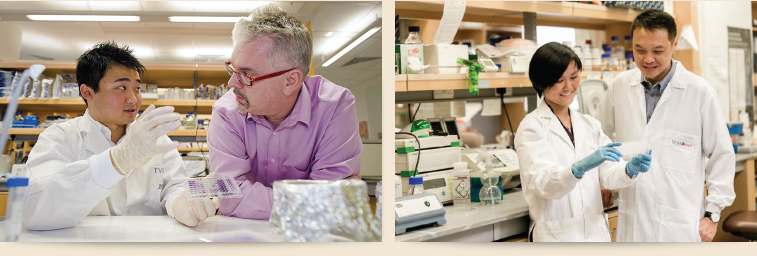
Spurred by their desire to improve medical delivery and patient care, newly-minted PhD alums Nicodemus and Eugenia have spent the best part of the past four to five years working on their research as part of their PhD programmes. To celebrate and welcome the inaugural batch of PhD graduates, Eugenia and Nico share their stories below.
|
|
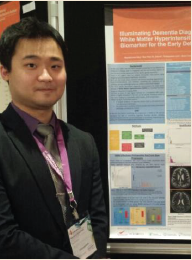 |
|
By Dr Nicodemus Oey, MD/PhD 2015
President of the Duke-NUS PhD Alumni Committee
Since high school, I knew I wanted to be a clinician-scientist when I was selected to be part of the "Be a Gene Researcher for a Week" programme sponsored by the Government of Canada. I wanted to make a difference in the way medicine is delivered to patients in an effort to improve patient care.
My research for the past few years have centred on the question "Why do we not have effective treatments for Alzheimer's dementia?", and this inquiry has taken me on an exciting journey through the physiology, pathophysiology, cellular biology, molecular underpinnings of neuroscience and memory formation. In short, I have been studying how we human beings form long-term memory, which is lost in dementia, and how we can intervene as doctors to
overcome this debilitating disease.
|
|
|
My time at Duke-NUS was highly fulfilling, but it was difficult as well. As a PhD researcher, every day was an adventure: experiments and equipment can fail and need troubleshooting, and at times, it was just heartbreaking. Looking back, the whole journey has been surreal, from learning about cutting-edge cell biology techniques such as single-molecule super-resolution microscopy to dissecting animals and collecting clinical data from patients, the spectrum of molecules to medicine was covered in the span of a few years, with much hardship and an equal amount of satisfaction.
The best part of it all was perhaps the publication of our group's findings of a molecular machinery or switch governing long-term memory formation - which is the impetus of a number of grant applications looking into developing novel Alzheimer's Disease therapeutics, as well as the completion of a neurorehabilitation project that aims to improve the way stroke patients can recover from.
Now that I am a House Officer at SingHealth, I aim to do as much as I can for my patients, my fellow healthcare practitioners and the healthcare system in general.
|
|
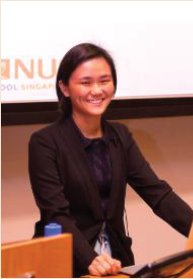 |
|
By Dr Eugenia Ong, PhD 2015
Vice-President of the Duke-NUS PhD Alumni Committee
In my last semester as an undergraduate at the Nanyang Technological University, I was fortunate enough to start working on my Final Year Project (FYP) in Assoc Prof Ooi Eng Eong's lab in the Emerging Infectious Diseases Programme. Working on my FYP made me realise the numerous scientific questions still left unanswered and how a better understanding of the complex relationship between viruses and their human hosts could be able to provide solutions for, and advance human health.
The topic was intriguing enough for me to apply for the inaugural PhD programme at Duke-NUS. Chief among my motivations of pursuing a PhD was the opportunity to take ownership of my own project. I was free to explore questions that would eventually shape my
project and challenged to come up with creative solutions to solve problems that came up during my research.
|
|
|
I started my PhD in Assoc Prof Ooi's lab and over the next four and a half years, my research focused on elucidating how the dengue virus is able to elude the human immune response by binding and activating leukocyte immunoglobulin-like receptor B1 (LILRB1), an inhibitory receptor on immune cells, whose normal function is to dampen excessive stimulation of immune responses. In this way, the virus is able to enter the cell using antibodies from a previous infection, but escape antiviral responses that would otherwise kill the virus.
Over the course of the programme, I was constantly challenged. While there were some results that came easy, others required a great deal of perseverance and tenacity. It would have been easy to give up, but I was spurred on by the encouragement of the people around me and partly by my own stubborn persistence.
The thesis writing process seemed daunting at first, I wrote fairly slowly as I was also running experiments at the same time - I thought I would not be able to graduate! But I powered through in the last few months before my thesis defence. The thesis is really like the encore section of a concert, you highlight a continuous string of hits that defined the "A-ha" moments of your PhD journey. It was immensely satisfying when I obtained the physical form of my thesis.
My PhD journey would not have been possible without the support and help of my lab members. Most days, I spent more time with my lab members than my own family. It's a blessing that we are as close-knit as we are, like a family away from home. I also have to thank my thesis mentor, Assoc Prof Ooi Eng Eong, for his advice and unwavering support. I learnt a great deal from him, about the importance of dreaming up big ideas and staying scientifically curious.
In April 2015, I started as a research fellow at the Experimental Therapeutics Centre at A*STAR. Although dengue infects nearly 400 million people annually, there is currently no licensed antiviral or vaccine for dengue. My current project focuses on characterisation and evaluation of a therapeutic antibody that is poised for upcoming clinical trials in humans. We aim to assess its usefulness in reducing virus burden after dengue virus infection.
|
|
Duke-NUS PhD Alumni Committee
|
|
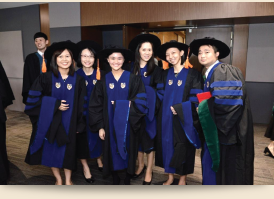 |
|
The inaugural Duke-NUS PhD Alumni Committee (DNPA) was recently set up. Dr Nicodemus Oey, as President of the newly formed committee, shares his plans on building and strengthening ties between the PhD alumni and the school.
With the establishment of the Duke-NUS Medical Alumni (DNMA) Society in 2013, which oversees MD-related alumni issues, and the inaugural convocation of eight PhD graduates and one MD/PhD graduate in May 2015, it was very fitting to materialise our very own PhD-specific Alumni Committee. PhD graduates have a number of unique issues pertaining to the alumni and
|
|
|
|
the workforce that differ significantly from the MD graduates. We are very thankful for the foundation of this Alumni Committee and owe a great deal of our founding to Ms Joan Ku from Duke-NUS Alumni Relations Office, who was instrumental in helping us form the initial nucleus of the Committee.
|
|
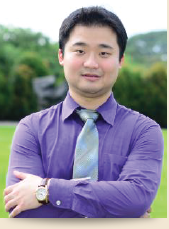 |
|
My goals as President of the inaugural PhD Alumni Committee are three-fold:
• Foster alumni bonds as we move forward with our respective careers
• Raise awareness of PhD-specific issues in the relationship between prospective, current and graduating students
• Maintain close ties with potential employers and collaborators from Singapore and beyond. To this end, one of my primary endpoints would be to strengthen ties with key stakeholders e.g. SingHealth.
All PhD alumni are automatically recruited as voting members. They are expected to participate and contribute through regular gatherings and meetings. One of the first few activities we participated in was the recent farewell for Dean Ranga Krishnan. We plan to reach out to the annual DUNES symposium and weekly PhD student seminars and eventually formalise the committee and register it as a society with the Singapore Registry of Societies.
|
|
|
|
|
Alumni Relations Office
Duke-NUS Graduate Medical School Singapore
8 College Road, Level 6
Singapore 169857
Email : alumni@duke-nus.edu.sg
Web : https://www.duke-nus.edu.sg
|
|
